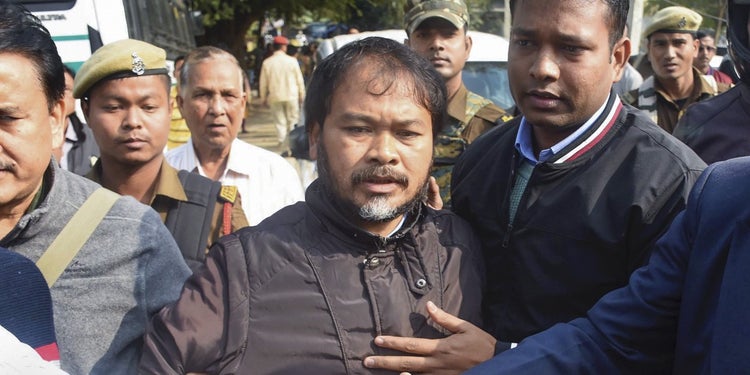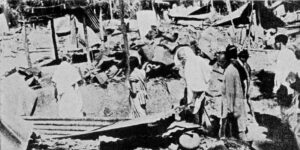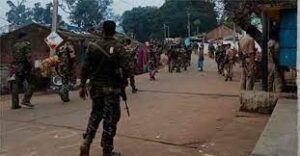Sandeep Pandey, Medha Patkar
Akhil Gogoi, leader of the largest grassroots mass organisation in Assam, Krishak Mukti Sangram Samiti, has been incarcerated under sections 18 and 39 of Unlawful Activities Prevention Act in addition to sections 120B, 124A, 153A and 153B of the IPC and the case handed over to National Investigation Agency, which was created to counter terrorism, because the Bhartiya Janata Party led government views him as a political challenge. Akhil Gogoi is the first accused booked under amended UAPA which now allows even individuals to be labelled as terrorist. His organisation has been supporting the state wide mass protests first against the Citizenship Amendment Bill and then the Act, and has taken a clear stand against the communal character of the law like no other mainstream organisation in Assam, because of which he has also been accused of favouring the illegal immigrants.
We believe that Akhil Gogoi’s activities are aimed at holding the authorities accountable, questioning the model of development and governance which promotes disparity, empowerment of common people, and deepening of democracy. He has used the Right to Information Act to expose corruption in government schemes, held protests against Lower Subansiri dam, taken action against toll plazas to give relief to common people, and undertaken constructive activities like establishing the Kaziranga National Orchid and Biodiversity Park in over four hectares of land, for which he should have been rewarded rather than being punished by successive governments in Assam. He is presently facing 137 cases in various courts of law and is a regular visitor to jails in Assam.
The charge against him of being a Maoist is false as the government doesn’t have any concrete evidence against him. He has been falsely accused of instigating violence during the anti-CAA protests from 10th to 12th December, 2019, the biggest protest that Assam has witnessed in recent times. Akhil was not present at any of the locations where violence took place during this period. The truth is that it was not just KMSS but common people who came out on streets and highways, just like at many places later in the country, in the movement against CAA–NRC. Unlike in the past when on many occasions organisations have led movements, this time it is the people’s movement that has forced the organisations to join them. While KMSS has been held guilty of violence, no action has been taken against the people responsible for killing of five individuals in Assam during these protests—Dipanjal Das, Sam Stafford, Abdul Alim, Ishwar Nayak and Azizul Hoque.
The government has conspired to put Akhil Gogoi and 23 of his activist colleagues in jail to cripple the strong challenge that the mass movement posed to it. In the popular struggle against the central government’s attempt to scuttle the Assam Accord after the BJP came to power in Assam, KMSS has been at the forefront of the protests with 70 organisations on board. The All Assam Students Union (AASU) soon after set up another front, with 30 organisations. While AASU has strong presence among students and sympathy among middle class, KMSS is a grassroots organisation with popular support among peasants and students. AASU, which led the movement during 1979–85 resulting in the historic Assam Accord, is now again in the leadership role in anti-CAA protests after 12th December 2019, and has an additional responsibility to maintain the revolutionary character of the movement. Akhil in an open letter from jail has written, “The way the AASU, Asom Jatiyatabadi Yuba Chatra Parishad and artists in Assam have united, KMSS, Forum against the Citizenship (Amendment) Act, civil society in Assam, college and university students, people’s organisations, tribal organisations, and other national organisations and crusading writers–intellectuals, as well as the citizens of Assam, must be united too. We believe that it is impossible to achieve our goal without such a unified national struggle.” Akhil has called for a unified forceful and intense mass movement, not merely symbolic, capable of bringing the government to its knees.
As AASU is opposed to CAA and has distanced itself from Asom Gana Parishad, a party which emerged from its movement in the 1980s but is now in alliance with BJP, it should come out openly and join hands with KMSS in building a political alternative to the BJP-led government in the State, a demand being articulated by many public-spirited citizens and intellectuals of Assam. There is no denying the historic role played by regional sub-nationalist forces in Assam’s public life and shaping its political trajectory to protect the interests of indigenous people, as well as attempts to resolve the migration question through cross-community dialogue and by holding the state accountable. They must now step in to fill the vacuum created due to anti-people central impositions and divide-and-rule policies of the BJP, and lack of any credible alternative. The popular sentiment sees a role for Akhil Gogoi in this resistance and emergence of alternative, and all people’s forces must join hands to demand his immediate release.
(Sandeep Pandey is with Socialist Party (India) and Medha Patkar is with National Alliance of People’s Movements.)




